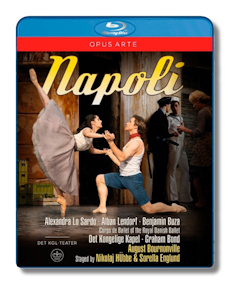
The Internet's Premier Classical Music Source
Related Links
- Latest Reviews
- More Reviews
-
By Composer
-
Collections
DVD & Blu-ray
Books
Concert Reviews
Articles/Interviews
Software
Audio
Search Amazon
Recommended Links
Site News
 Blu-ray Review
Blu-ray Review
Edvard Helsted, H.S. Paulli, H.C. Lumbye and Louise Alenius

Napoli
- Alban Lendorf - Gennaro
- Alexandra Lo Sardo - Teresina
- Benjamin Buza - Golfo
- Lis Jeppesen - Veronica
- Alba Nadal - Giovanina
- Mette Bødtcher - Flora
- Jean-Lucien Massot - Peppo
Artists of the Royal Danish Ballet
Det Kongelige Kapel/Graham Bond
Choreography by Sorella Englund, Nikolaj Hübbe after August Bournonville
Opus Arte Blu-ray OABD7185D 105m Widescreen LPCM Stereo DTS HD Master Audio
Also available on DVD OA1195D: Amazon - UK - Germany - Canada - France - Japan - ArkivMusic - CD Universe - JPC
Although the Royal Danish Ballet is one of the most prestigious and beloved companies worldwide, it has so far been largely overlooked by video producers. Centered around the repertoire of choreographer and ballet master August Bournonville the Danes preserve a cultural heritage unique in the world, begging to be preserved and shared on film. This new release on blu-ray and DVD by Opus Arte of the Bournonville classic Napoli carried all the promises of a step in the right direction. However, after seeing this video, I felt strongly tempted to paraphrase the old Bard, because clearly, all is not well yet in the state of Denmark.
This being more than anything the age that requires immediate social relevance for every public action and questions everything which has long been taken for granted, the hallowed 19th-century repertoire of Bournonville is now no longer safe from more or less drastic reinterpretations and interventions either. All very fine and large, yet the trouble is when tampering with a tradition that has been solidified for generations, you need to know very well what you are doing, what to change and what best to leave untouched, unless you want to end up with a caricature or a hack job, and had better start something entirely new. This new version of the romantic Bournonville ballet Napoli (originally dating from 1842) by Nikolaj Hübbe and Sorella Englund is neither, but still fails in the sense that it lacks the necessary authority and direction to fully support its claims as a theatrically viable alternative.
Originally a love story between a fisherman Gennaro and his girl Teresina set in the then beloved exotic locale of early 19th-century Naples, the ballet is brought forward to the 1950s in a Fellini-like setup - no more cute and lovely activity, but raw verismo with mafia references, bubblegum munching prostitutes and spaghetti sauce stains on the apron of the macaroni seller. For what it's worth, this update is more amusing than really significant. Less convincing, however, is that the producers choose to erase the crucial religious element which was in Bournonville's vision the cornerstone of the original story. Hübbe replaces it with love, but that's not really enough. And even less convincing is that as a result of all the meddling Napoli now looks like a collection of three unrelated episodes. Crucial dramatic moments in the story (such as the drowning of Teresina and her miraculous reappearance) are confusingly staged or miss theatrical impact. Checking the synopsis in the booklet doesn't help because you don't see what you read. The second Act depicting Teresina in the sea was re-choreographed, with a newly commissioned score from the Danish composer Louise Alenius (° 1978) (something on which this release is bizarrely laconic, except for a brief note on the back of the slipcase) and that may well be the best novelty of the rework, even if dramatically the setup is as watery as the events it's supposed to portray.
Elaborate new designs from Maja Ravn are visually striking and include some excellent stage effects, but often smother (at least on video) the dance. Even the famous third Act, which is by its feisty Bournonville choreography, gathering the whole company from children to principals on stage in a merry celebration of dance, a national Danish treasure (and remains thankfully largely unchanged in this production), looks boxed in by the obtrusive sets. Yet eventually it's the filming which reduces this video to a dismal failure.
Shot on the Old Stage of the Royal Theatre in Copenhagen in March 2014 by Uffe Borgwardt and Peter Borgwardt, Napoli goes sadly down like the perfect example of how not to film a ballet. The hyperactive editing chops up bodies and lines in multiple angles, making it virtually impossible to follow the movements, let alone appreciate the larger structures of the choreography. Dancers are shown from all angles, except the right one, the cameras frequently zoom in on bystanders while the main action happens center stage. There is a particularly horrendous floor-level camera on the edge of the stage which distorts anything it captures and is very obviously in the sightline of other cameras.
Visuals are otherwise pretty impressive in the HD format (the close-ups reveal a wealth of details in faces and costumes), but the often bleached whites further hint at a lack of preparation and quality control. Sonics are fine even if they won't blow you away, and March seems a particularly bad month for bronchial disorders in Denmark. There are no extras and the booklet only provides a synopsis and a short introduction from Hübbe.
All the more a shame because the dancers, especially the young leads Alban Lendorf and Alexandra Lo Sardo, are excellent. Characteristically joined by some of the older company artists like Lis Jeppesen, Mette Bødtcher and Poul-Erik Hesselkilde in mime roles, they all deserve far better than the Borgwardt team is able to give them.
Well performed, but fatally short on charm, clumsily told and abysmally filmed, here is hoping the next release from the Royal Danish Ballet will prove a better showcase of this wonderful company.
Copyright © 2014, Marc Haegeman





















